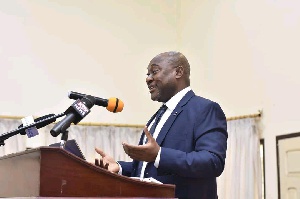 Prof Gordon Akanzuwine Awandare
Prof Gordon Akanzuwine Awandare
Professor Gordon Akanzuwine Awandare, Director of West African Centre for Cell Biology and Infectious Pathogens at the University of Ghana has bemoaned Africa’s abysmal contribution to the global research production.
He said as at 2016, Africa’s contribution to the global research production stood at three per cent while contributing only 0.8 per cent of the global resources to research.
“Meanwhile, research and innovation is the most important pillar for economic development and remained essential for the sustainable development of the continent,” he noted.
Prof. Awandare shared the sentiments when he spoke on the topic “Building Research Intensity Ecosystem in Africa” at the fifth research awards and grants ceremony at the University of Cape Coast (UCC).
He noted that African countries were mostly unable or unwilling to commit resources to science, research and innovation and that only few met the commitment to spend one per cent of their GPD on science and research.
In this regard, Prof. Awandare reiterated the need for African governments to move towards research intensity by showing sustained commitment to funding science, research and innovation.
Additionally, he encouraged African governments to establish a dedicated research and innovation fund and fulfil the one per cent of GDP commitment for research.
He asked them to make conscious efforts to create a research-minded governance system by revising policies to make them more research-friendly.
He called for the modernising structures at the institutional level to simplify the procurement procedures for research equipment and supplies, increasing graduate student enrolment at the universities to sustain the gains made in the research ecosystem of Africa.
He underlined the critical role of universities in providing knowledge, innovations and solutions through research, saying, “universities are the best places to build sustainable research capacity”.
Prof. Awandare also highlighted the need for universities to create the needed environment where people could dedicate time to research, facilitate interdisciplinary research and training programmes as well as promote grantsmanship culture.
Professor Frederick Ato Armah, Director of Directorates of Research, Innovation and Consultancy (DRIC) said the award ceremony was to motivate and honour faculty members who had either shown the potential to engage in impact-oriented research or had distinguished themselves in same.
He said in the past, the university gave the research grant to only senior members who were teaching but had expanded to include non-teaching senior members who as part of their promotions requirement needed to publish.
He indicated that research at UCC had steadily improved which had qualified the university to be ranked by the Times Higher Education Global Rankings
This, he attributed to the funding they have given to research over the past four years.
Plaques, certificate of recognition and undisclosed sums of money were awarded and granted to 45 research teams and individual researchers of the university.
Dr Michael Osei Adu and Professor Kwame Agyei Frimpong both at the School of Agriculture and Dr Issahaku Adam of the Faculty of Social Sciences, all received the best evolving researchers awards.